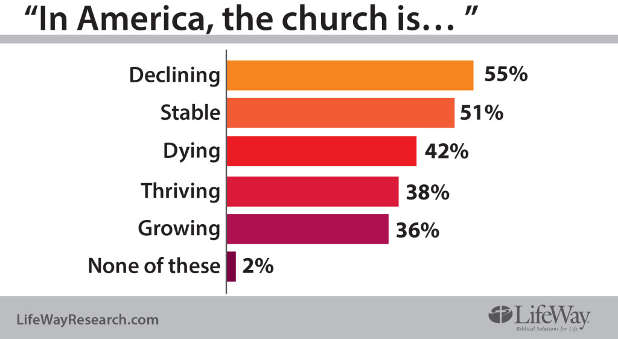
Although most Americans believe church is on the decline, the overwhelming majority says it finds value in attending.
A new survey from Nashville-based LifeWay Research reveals an upbeat attitude toward churchgoing. Two-thirds of Americans think attendance is admirable, and nearly 9 in 10 call it acceptable. Only 11 percent consider church useless.
Even nonreligious people have favorable opinions. Eighty percent believes church attendance is acceptable, and 43 percent label it admirable. Just 29 percent call it useless.
Yet more Americans believe the church is dying than thriving, according to the LifeWay study. Researchers asked 1,000 Americans about their views in a phone survey from Sept. 19-28, 2014.
"Americans have a much more optimistic view of the people and practice of attending church than they do of the health of the church," said Scott McConnell, vice president of LifeWay Research. "Church attendance is much like regular exercise and driving the speed limit. People do not live out everything they admire."
Confirming McConnell's assertion that Americans' churchgoing is at odds with their behavior, even on Easter, traditionally the best-attended Sunday of the year, large segments of the population say they don't plan to attend, previous LifeWay research has found.
And despite their professed fondness for church, Americans are more likely to believe attendance is declining (55 percent) or dying (42 percent) than growing (36 percent) or thriving (38 percent).
Their attitudes reflect the mixed trends of the past 50 years. While many mainline denominations have lost membership, some have grown. And while more people are Christian today than in 1970, Christians make up a smaller share of the burgeoning population, according to a study from Gordon-Conwell Theological Seminary.
Out of Date?
Faced with those trends, many churches have shifted toward contemporary worship styles and new outreach methods. Nevertheless, 27 percent of Americans think church attendance is outdated, LifeWay research found. That belief is even more pronounced among the nonreligious (42 percent), Catholics (31 percent), and people 25 to 34 years old (34 percent).
Those young adults, part of the Millennial generation, are also more likely than their elders to describe church attendance as unusual (26 percent). Compared to previous generations, fewer Millennials claim religious affiliation or profess belief in God, according to the Pew Research Center.
Young adults, like most Americans, don't see church attendance as an assumption in today's culture. While 54 percent of those over 65 describe churchgoing as an expectation, that viewpoint is in the minority for every other age group – a sign that those who attend are making a personal choice rather than responding to societal pressure.
That's a positive finding, said McConnell. "I don't think evangelicals would want that to be the reason people go to church anyway."
Men, Hispanics More Likely to Find Church Useless
Women have more positive attitudes than men about churchgoing, the LifeWay study found, with 69 percent of women and 63 percent of men viewing attendance as admirable. Only 9 percent of women consider church useless, while 14 percent of men hold that opinion.
Larger shares of women also believe in the health and vitality of the church. Forty percent of women say the church is growing, and 41 percent describe it as thriving. Among men, only 32 percent think it is growing, and 34 percent label it thriving.
LifeWay Research also found significant differences along ethnic and racial lines.
Although most Hispanics believe going to church is expected (55 percent), attendance is considered useless by 1 in 5—almost double the rate of the population as a whole.
Whites are among the least likely to consider church useless (8 percent), but 60 percent believe the church is declining.
In contrast, most African-Americans believe the church is growing (55 percent) and thriving (56 percent). More often than other groups, they describe church attendance as common (74 percent) and popular (61 percent).
"The longevity of the Christian church proves it is not a fad," said McConnell. "Some Americans feel cultural expectations to attend church, but our recent research shows that those who actually do attend hold more closely to the teachings of Jesus Christ."
Lisa Green is a freelance writer in Nashville, Tennesee.
For the original article, visit pastors.com.
Methodology
The phone survey of Americans was conducted September 19-28, 2014. The calling utilized Random Digit Dialing. Sixty percent of completes were among landlines and 40 percent among cell phones. Maximum quotas and slight weights were used for gender, region, age, ethnicity, and education to more accurately reflect the population. The completed sample is 1,000 surveys. The sample provides 95 percent confidence that the sampling error does not exceed plus or minus 3.4 percent. Margins of error are higher in sub-groups.
Get Spirit-filled content delivered right to your inbox! Click here to subscribe to our newsletter.
Dr. Mark Rutland's
National Institute of Christian Leadership (NICL)
The NICL is one of the top leadership training programs in the U.S. taught by Dr. Mark Rutland. If you're the type of leader that likes to have total control over every aspect of your ministry and your future success, the NICL is right for you!
FREE NICL MINI-COURSE - Enroll for 3-hours of training from Dr. Rutland's full leadership course. Experience the NICL and decide if this training is right for you and your team.
Do you feel stuck? Do you feel like you’re not growing? Do you need help from an expert in leadership? There is no other leadership training like the NICL. Gain the leadership skills and confidence you need to lead your church, business or ministry. Get ready to accomplish all of your God-given dreams. CLICK HERE for NICL training dates and details.The NICL Online is an option for any leader with time or schedule constraints. It's also for leaders who want to expedite their training to receive advanced standing for Master Level credit hours. Work through Dr. Rutland's full training from the comfort of your home or ministry at your pace. Learn more about NICL Online. Learn more about NICL Online.


